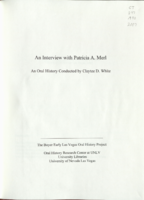Search the Special Collections and Archives Portal
Search Results

Transcript of interview with Dayvid Figler by Barbara Tabach, June 22, 2016
Date
Archival Collection
Description
Dayvid Figler (1967 - ) is the quiet boy who became an insightful and creative contributor to the local culture of Las Vegas. The oldest of Barbara and Meyer Figler?s three children, he was four years old when the family station wagon reached Las Vegas in 1971. They moved in with Uncle Izzy (aka Big Irish) Figler for a few months. Having the ?juice,? Dayvid?s father soon became a Pan dealer on the Strip. As the family grew, Barbara eventually immersed her energies in her children?s activities, Hadassah and Temple Beth Sholom. In this oral history, Dayvid also recalls his awkward, but incredibly interesting youth, his bar mitzvah at Temple Beth Sholom, and path to a successful career as a criminal defense attorney. He also talks about embracing Las Vegas as his home, owning a home in John S. Park neighborhood and mentions a number of literary depictions of Las Vegas that he admires. Dayvid describes growing up a ?casino kid? who lived in an apartment near the Riviera Hotel. This, in addition to his slight stature and academic brilliance, may have set him apart from many of his childhood peers. He graduated from Valley High School at the age of 16 and by the age of 23 he was a rising star in the legal world. He looks back with appreciation to his list of mentors who encouraged him along the way. Dayvid is also a local favorite as an essayist and poet. For a number of years he could be heard on KNPR/NPR. He has been a performer in hundreds of productions that featured his comic wit and writings, from Lollapalooza to Tom and Jerry?s on Maryland Parkway.
Text

Transcript of interview with Michael J. Montandon by Stefani Evans and Claytee D. White, September 22 & October 4, 2016
Date
Archival Collection
Description
Mike Montandon, former Arizonan and former three-term mayor of the City of North Las Vegas (1997-2009), is a natural storyteller. As he recalls municipal governance during a period of record-breaking growth, he talks of forming relationships with developers, legislators, and other municipalities; he speaks to land use, open space, parks, trails, conservation and the Bureau of Land Management (BLM) and Southern Nevada Public Lands Management Act (SNPLMA). He shares histories and stories of the Becker family's role in developing Clark County, of the Combs family's North Las Vegas pig farm; of the drama that routinely characterized BLM land auctions, and of why North Las Vegas spent millions of dollars to build its own sewage treatment plant. The guy who never ran for office in high school or college moved to North Las Vegas in 1992 and four years later was elected as mayor of one of the nation's fastest-growing cities. He ran because he realized the City was populated with people just l
Text

Moises Denis interview, January 11, 2019: transcript
Date
Archival Collection
Description
Interviewed by Marcela Rodriguez-Campo. Laurents Bañuelos-Benites, Maribel Calderón, and Barbara Tabach also participate in the questioning. Moises "Mo" Denis is a Cuban American born in Brooklyn, New York. He served as the first Latino Majority Leader in the Nevada State Senate and has been involved in public service for over 30 years. As a leader in the Church of Latter Day Saints and his involvement with supporting Latinx initiatives, Mo has been able to increase the representation of Latinos in politics and support educational reform. While early on his family moved around a lot, they finally settled in Las Vegas and have continued to grow their family. Mo is a Rancho High School alum and went on to graduate from Brigham Young University as a music major. He first started his career by opening a music store, but later began working in the tech industry. Eventually, through his involvement in the PTA, Mo was appointed to serve on the Clark County Library Board. There he was involve
Text

Transcript of interview with Pat Merl by Claytee White, October 9 & 28, 2008
Date
Archival Collection
Description
Patricia 'Pat' Merl plans for college did not materialized after graduation from a New Jersey high school in the late 1960s. Instead she took a receptionist job. The by the age of 19, it was her interest in dance classes that would lead her to audition to be a professional dancer for the Rockettes of Radio City Music Hall fame. Her days and weeks were filled with rigorous rehearsals and performances, but it was also an exciting time for a young and spirited girl. A side trip to Las Vegas in 1971 during her first ever vacation opened her to a new world of possibilities for a professional dancer. So without a job, she decides to remain in Las Vegas and explore the options. It became the beginning of a wide and varied career in the live entertainment industry. Pat's dancing resume includes working in many of the Las Vegas chorus lines of the 1970s, provides a flavor of what the work was like then and how it changed during the era. She includes the story of Frank Rosenthal and
Text

Transcript of interview with Julie Menard by Joyce Marshall, March 17, 1996
Date
Archival Collection
Description
Julie Menard began her career as a showgirl in 1964, performing in the Folies Bergere at the Tropicana Hotel. Although she appeared in the show for only sixteen months, she offers an insider’s view of the early Las Vegas entertainment scene. She describes a period when showgirls were treated as local royalty and “the boys” wielded considerable influence. Menard’s narrative sheds light on the glamour and complexities of the showgirl. Her descriptions of physical characteristics of the job, the day to day work schedules, the expectations of physical beauty, as well as the stigma of her occupation outside of Las Vegas offer a fuller view of the job. Menard left Las Vegas in 1966 to pursue a film career in Europe but like many Las Vegas entertainers, she returned to make the desert city her home. Although her brief performing career failed to prepare her for future employment, she relishes her brief experience as a showgirl. Her narrative evokes the glamour, excitement and mystery of Las
Text

Transcript of interview with Ruth E. Hazard by Jeff Crampton, March 27, 1977
Date
Archival Collection
Description
On March 27, 1977, collector Jeff Crampton interviewed accountant, Ruth E. Hazard (born June 25th, 1907 in Marshall, Michigan) in Las Vegas, Nevada. The interview takes place at the collector’s home and offers an overview of life in early Las Vegas from 1931 to 1977. The interview concludes with a discussion on local atomic testing.
Text

Transcript of interview with Velma Holland by Beatrice Scheid, April 6, 1976
Date
Archival Collection
Description
On April 6, 1976, collector Beatrice Scheid interviewed housewife Velma Holland (born October 17th, 1903 in New Market, Iowa) in her home in Boulder City, Nevada. This interview covers her early life in Boulder City. Mrs. Holland, Connie Degennes, and Beatrice Scheid are present during the interview.
Text

Transcript of interview with Christie Young by Dennis McBride, October 18, 1998
Date
Archival Collection
Description
I've known Christie Young for many years and was grateful she agreed to be interviewed for the Las Vegas Gay Archives Oral History Project. Not only is she frank in what she says, but her background as a researcher in sexual issues and as a straight woman involved in the gay community give her a unique perspective. Ancillary to her donation of this interview transcript to the University of Nevada, Las Vegas, Christie has generously donated her personal journals which detail more than a decade of her life including the years she worked with Las Vegas's gay community . Christie shares the project's concern that documentation of the gay community is ephemeral and vanishes rapidly; her determination that her contribution to that community be preserved greatly enriches our knowledge and will benefit future scholars.
Text

Transcript of interview with Tony Grasso by Coleen Seifert, February 29 & March 1, 1980
Date
Archival Collection
Description
On February 29, 1980, Coleen Seifert interviewed Tony Grasso (born 1926 in Brooklyn, New York) about his career in gaming. Grasso first provides details on his background and how he ended up moving to Las Vegas in 1951 before talking about his experience as a dealer in some of the early casinos. He also talks a little about the different roles and games that casino workers deal and how players are invited to visit casinos. The interview concludes with a discussion on gaming unions and Grasso’s future plans. On a date that soon followed the above date, Seifert also interviewed Doug Charles (born 1954 in Brooklyn, New York) about his career in the gaming industry. Charles also talks about his family background, his arrival to Las Vegas in 1957, and the early development of the various gaming properties in Las Vegas. He later goes into detail over some of his experiences as a dealer, his opinions on mob control over gaming, and some of the political and legal issues that have arisen in La
Text

Transcript of interview with Walter Weiss by Claytee White, November 2, 2010
Date
Archival Collection
Description
In this interview, Walter Weiss discusses how Judaism and boxing kept him out of trouble in his youth. Weiss grew up in the Boston area, and started boxing as a teenager. Weiss talks about his boxing training, becoming a runner for a bookmaker, and coming to Las Vegas in the 1950s to be a bookmaker for the Stardust Hotel, and working the slot machine floor. He had several different jobs in various casinos, and discusses different people involved in the gaming industry in Las Vegas.
Walter Weiss life story begins in a Malden, Massachusetts during the Great Depression. His early background was a blend of observant Judaism, secularism, and the effects of the era. He was a troubled youth whose older brother encouraged him to join him in boxing. As Walter explains: I was a wild kid and ... boxing saved my life. His aptitude for boxing led him to be a sparring partner in New York City's famous Spillman Gym. There he met and worked out with some of the greatest fighters of the era, including Rocky Marciano. He recalls how he turned professional while attending the University of Miami and how he first came to Las Vegas in 1958 to escape his personal troubles and find work with a local bookmaker. Thus began his diverse employment history in the casino industry. He details his various positions and the cast of famous and infamous characters of the times. For six years he return to New York and worked as a Wall Street broker before arriving back in Las Vegas in 1973. He talks about his property ownership, lobbying for an amendment to Senate Bill 208, his personal religious changes and a sundry of observations about the changes that occurred as the state took over gaming.
Text
